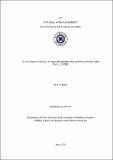Please use this identifier to cite or link to this item:
http://hdl.handle.net/11547/7499| Title: | US-AFGHANISTAN RELATIONS IN OBAMA ERA OPPORTUNITIES AND CHALLENGES |
| Authors: | ZAFAR, Sayed Saboor |
| Keywords: | Surge Strategy, Counterterrorism Counterterrorism Counterinsurgency Insecurity Tense Relations Stabilization Strategy Exit Strategy Challenges Opportunities |
| Issue Date: | 2020 |
| Abstract: | U.S.-Afghan relations in the 21st century was reestablished after the September 11 attacks in the United States, disintegration of the Taliban regime and installation of an interim government in Afghanistan. President George W. Bush soon after the incident attached the attacks to the Al-Qaida Network, hence this network’s identity was constructed and promoted at a global scale. President Bush declared a, Global War on Terror arguing that the international community was unified to participate in the war and Afghanistan became a focus of U.S. foreign policy. This thesis is about U.S.-Afghanistan relations in the Obama era. I used a secondary source analysis to assess the two states’ relations with each other to find out what were the key bilateral challenges and opportunities. When President Barack Obama entered office, he inherited a war from his predecessor, while the security situation was worsening in Afghanistan and a pessimism was dominating the prospects of the war. Obama announced a new strategy in 2009, that emphasized troop surge in the country and counterterrorism approach was replaced with counterinsurgency approach. Subsequently, when he realized that the threat was decentralized, he announced Afghanistan and Pakistan strategy to disrupt, dismantle and defeat Al-Qaida and its affiliate groups, in addition, to build Afghan National Security Defense Forces. The U.S.-Afghan administrations experienced irritated and tense relations in this period. Initially, the opposition of Afghanistan President Hamid Karzai to Obama’s policy in Afghanistan opened a new chapter of distrust and sparked the tense relations between the two administrations. Furthermore, intervention of the U.S. in the domestic politics of Afghanistan was perceived as a violation of Afghanistan’s sovereignty by President Karzai and elevated the tense relations. xii The conclusion derived from this study describes that troop surge policy of Obama caused escalation of insecurity in Afghanistan which not only affected Afghan national security forces, but coalition and U.S. troops as well. But the U.S. stabilization strategy was constructive because thousands of large, medium and small-scale projects in diverse infrastructural aspects through an expenditure of hundreds of millions of dollars have been implemented and enabled Afghan government to practice its legitimacy and sovereignty. The US-NATO withdrawal impacted the internal situation of Afghanistan, the security situation worsened which then caused – internal displacement and outmigration to Europe. The local workforce of international forces lost their jobs, poverty and social deprivation increased, employment and economic growth declined. Whilst, the key bilateral challenges comprised corruption, narcotics production and insecurity in Afghanistan and the bilateral opportunities that this study explored were integration of Hezbi-e- Islami Gulbuddin, signing of strategic partnership agreement and bilateral security agreement which ensured both states interests. |
| URI: | http://hdl.handle.net/11547/7499 |
| Appears in Collections: | Tezler -- Thesis |
Files in This Item:
| File | Description | Size | Format | |
|---|---|---|---|---|
| 10344834 SAYED SABOOR ZAFAR.pdf | 2.14 MB | Adobe PDF |  View/Open |
Items in DSpace are protected by copyright, with all rights reserved, unless otherwise indicated.
